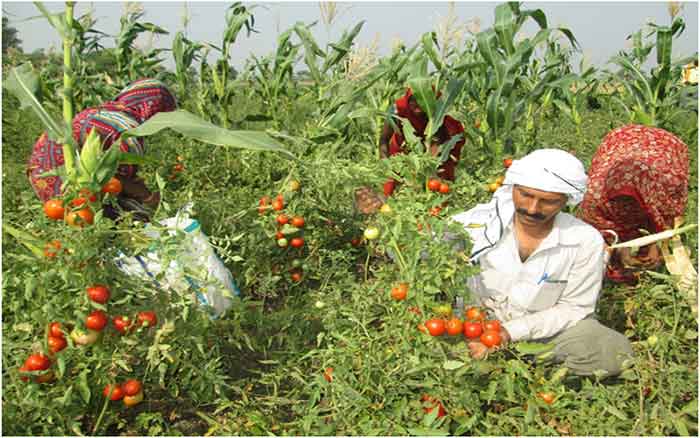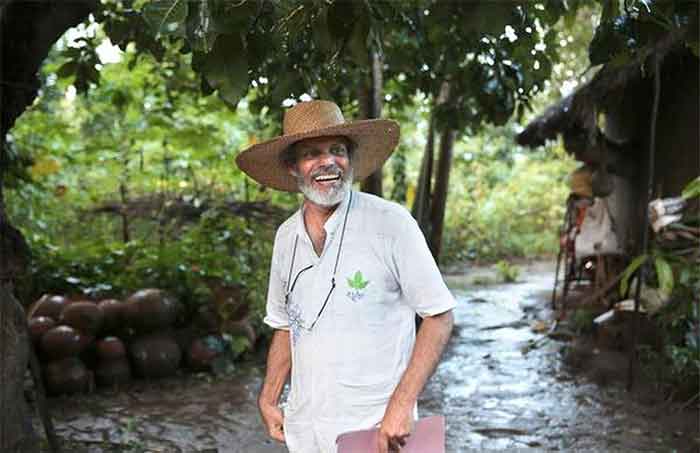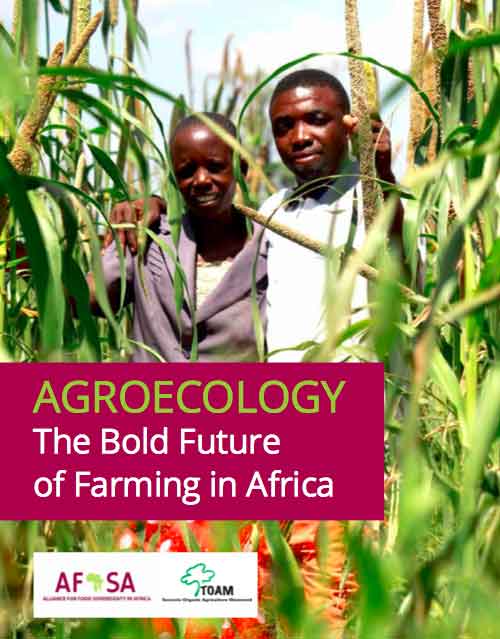
Agriculture in our country today is in a profound crisis. Wherever we look we see the evidence of this: static or falling crop yields, crop failures due to too little or too much rainfall, rampant diseases and pests and wild animal attacks, loss of crop and domestic animal biodiversity, soil erosion, deforestation, falling water tables, water-logging and soil salinisation, chemical pollution of soils, food, and ground water, farmer indebtedness and alienation of youth from farming. Some of these problems are as old as the practice of agriculture itself, some of them have arisen only during the past 50 years or so. All, however, are the result of our collective inability to understand natural processes and our failure to learn from past mistakes. Such heedlessness cannot continue if the future of our agriculture, national food security and general well-being as a nation are to be secured.
Let me hasten to add that this scenario is a worldwide phenomenon. And it has wider implications as well. The practice of chemical, mechanised agriculture today is contributing to as much as half the world’s emissions of greenhouse gases, and is contributing substantially to the depletion of finite supplies of petroleum, phosphates and increasingly other minerals as well, and to the general environmental degradation that is now occurring.
x
Ancient India had a fairly robust science that gave rise to an agriculture that was reasonably sustainable; at least it was more enduring than present agriculture, continuing for several millennia as compared to a mere half century for the Green Revolution agriculture now practised. That science might be termed the science of living systems, for the Earth and everything on it were seen as living entities, whose health could be adversely affected by violent human interventions. Its goal was the accommodation of human activities within this earth system. In contrast to this, the rationale of modern mechanistic science is the domination and control of nature, even to the extent of attempting to redesign it. But we are damaging nature, disrupting natural processes in attempting to do this. Modern ‘scientific’ agriculture is an unviable agenda. It has no future.
During the 20th century, a few scientists came to accept this fact – because their research produced results that could not be explained in terms of the theories of mechanistic science. These were mainly physicists and biologists. The alternative theories they designed amounted to an alternative science, one very similar in essence to that of the ancients; it recognised the livingness of all entities, even those that were supposed to be dead, inert matter, and the interdependence of all entities. This alternative science appeals to more and more people as an explanation for the present flood of negative feedback from the practice of modern agriculture, industry and lifestyles in general.
Also during the 20th century, a few farmers here and there saw clearly that chemical agriculture is destructive and unsustainable, and began innovating boldly with alternative practices. They did not articulate the scientific rationale for these practices, but, as they seemed to work, these innovators continued their efforts to develop them. These practices have come to be known as natural farming, or ecological farming. And, when one attempts to rationalise these alternative systems of farming, one finds that the theoretical framework they presuppose dovetails neatly with the science of living systems pioneered by scientists. Both these 20th-century developments can be seen in a broad historical perspective as elements of a transformation in science and society, as momentous as that of the 17th-century in Europe at the hands of Descartes, Galileo, Kepler and Newton. Most of us, agricultural scientists, policy makers, and administrators, have yet to acknowledge this process of transformation and participate in it. Yet the future of our nation, demands of us that we do so.
Nevertheless, it is necessary to explain the fact that the ancients, their science of living systems notwithstanding, failed to create truly sustainable systems of farming. Rampant deforestation, soil erosion, water-logging and soil salinisation enfeebled agriculture and led to the ultimate demise of the ancient empires of the Mediterranean littoral, ancient Babylon and the Indus Valley civilisation. Indian farming survived, but was reduced to the low, steady state of productivity that characterised it at the beginning of the 20th century. Why did this happen? We can only surmise that the peoples of those times, like people today, were selfish, greedy and short-sighted, seeking only immediate, personal gain, over-riding their best intentions, and ignoring the fallout from their own past behaviour. Today we can no longer afford to do this. New ethical standards are needed in addition to a new science.
x
I wish to suggest that we scientists, each one of us, ask ourselves what the agricultural establishment needs to do in order effectively to address our current agricultural crisis. Clearly a continuation of ‘business as usual’ is not an option. We must realise at the outset that, given our present scientific paradigm, we are part of the problem, and thus cannot, as we are, be part of its solution. No amount of reform or fine tuning of our present paradigm will suffice; these only confound the problem. Our first task, therefore, is to change our outlook fundamentally.
Admittedly, this is not easy, but it must be done. The means of doing it are the institution of small-group, self-initiated transformative learning exercises among ourselves. In these exercises we reflect on all we have been taught and all that we think we know. We must, in other words, attempt to identify and then question fundamentally every one of our present assumptions about the world and about ourselves. If these assumptions are found to be logically faulty or are not borne out by present empirical evidence, we must reject them. We will then be able to formulate possible alternative assumptions – and then test them in practice. Our entire research agenda will be radically changed. And we must, in our teaching, challenge our students in the same way; our classroom activities, for the foreseeable future, must be converted to transformative learning exercises. But before we can do this, we must first successfully engage in such an exercise ourselves.
In the next section I will offer my own vision, based on the considerations outlined above, of an agenda for agricultural education and research in the future.
x
Professional agricultural scientists are a recent phenomenon in the 10,000-year history of crop cultivation and animal husbandry. Before they appeared on the scene, our ancestors devised sophisticated relatively sustainable systems finely tuned to the conditions of each region, and, indeed, each village. At any rate their systems were far more sustainable than our present green revolution system which is collapsing completely after only half a century. They themselves were the scientists, the innovators and experimenters. Young people learned from their parents and community members as informal apprentices. We would do well, to begin with, to acquaint ourselves with their scientific and educational protocols.
Farmers in the past recognised that every village, every field is unique, a distinct natural system. They tailored their crops and domestic animals to the limitations and possibilities of each of these myriad small units, by a continuous process of testing and selection in situ. Their fields and farms were their experiment stations. They had no laboratories, and judged soil quality by visual and tactile means. They lived on their land round the year; they were integral parts of their environment. We recognise in all this an accommodation mode of living with nature; a controlling mode of thought and action was foreign to them.
Of course, as already mentioned, they were oblivious to the consequences of deforestation, soil erosion and water mismanagement, so that their systems were not sustainable in the long run. The productivity of the land had reached a low, steady state of productivity as early as 1000 years ago.
The science of chemistry was developed in Europe in the 18th century and was complete in its essentials by the beginning of the 19th century. Soon it was adopted as the organising theme of agriculture, as the term ‘agricultural chemistry’ signifies. Thenceforth, soil was considered a lifeless aggregation of mineral particles that provided physical support to crop plants and a source of chemical nutrients dissolved in water. These chemicals, along with water itself and the atmosphere provided all the nutritional requirements of plants. An analogous chemical approach to the nutrition of domestic animals was also adopted.
This concept and practice of chemical agriculture was introduced into India during the second half of the 19th century. Increasingly strenuous efforts to foster this mode of agriculture were made during the first half of the 20th century; fertiliser experiments were laid out, and agriculture departments, colleges and research institutes were established. All this was done by the British colonial rulers of the country. After independence, the government of the USA largely took over this role of introducing chemical agriculture in the country. By the early 1960s large numbers of our countrymen were trained in the science and practice of chemical agriculture, and traditional knowledge was on the wane. In 1965 crop failures threatened large-scale famine, and we adopted chemical agriculture without reservation as the only way to ensure food security. Farmer scientists gave way to professional institutional scientists.
We are now in a position to formulate a broad vision of the way forward in securing food security, and the welfare of village communities and the nation. First, farmers, farm families and village communities must be re-empowered to take the responsibility for realising this agenda. They must realise that they themselves are better scientists and teachers than the professional, career scientists who spend all their time in the classroom, the laboratory and the experiment station. And we need to realise it too. Only if we accept this fact of history, can we move on to realising our objective of sustainable agriculture, continuing food security and rural and national welfare.
Given this change in outlook by everyone concerned (farmers, professional scientists, teachers, extension workers, administrators and politicians), the practical measures that need to be taken fall logically into place. It must become the objective of all establishment personnel to work with farmers, not as advisors, but as facilitators of the process of farmer re-empowerment. This will involve encouraging them to identify the causes of their present plight, visualise remedies and assisting them in implementing these remedies. This activity will amount to transformative learning exercises for farmers since they too have been brainwashed into adopting the chemical agricultural paradigm. In the course of such exercises, they may be encouraged to recall traditional practices and to examine them for their possible value as remedies. If these practices make sense, then farmers need to pursue them again. Many innovative ideas will inevitably be generated. They need to be helped to articulate their understanding of the rationale for these traditional practices and for new innovations. In facilitating such discussions we ourselves will learn along with them. Both men and women need to be included in these discussions (the term ‘farmers’ is gender neutral), as well as village residents pursuing non-farming livelihoods, and landless families. At least one adult member from every household in the village should participate in these discussions.
At the same time, farmers, farm families and village communities need to re-empower themselves as teachers of village youth. Training in agriculture needs to follow the traditional apprenticeship pattern. Such training needs to be integrated with a more comprehensive education that fits young people for participation in the larger national and international communities on an equal footing with urban-reared young people. A pre-requisite for such an educational curriculum is the replacement of contemporary mechanistic science by the science of living systems as the rationale for all subjects. The village community itself needs to design, implement and oversee such an educational programme. If this is done effectively at school and senior secondary levels, university curricula will then fall in line. We need to help organise and then facilitate discussions aimed at bringing about such change. Adolescent boys and girls (grades 9 to 12) should participate in these discussions. The appropriate place for these discussions is the gram subha. Gram subhas should be the policy-formulating bodies, while the gram panchayats are the administering bodies.
To facilitate all these initiatives Government laws and policies will need to be overhauled fundamentally. Examples here are the return of reserved forests to village community ownership and use, the discontinuance of all flood irrigation projects (in favour of local water self-sufficiency), closing all fertiliser and pesticide factories (natural farming does not use any of these), the discontinuance of government subsidies on electricity and chemicals, transferring responsibility for community food security, to the extent possible, to village communities themselves, the curtailing of MNCs dealing in farm inputs, including machinery (natural farming is human and animal power intensive), long-distance transport of food ((local and seasonal vegetables and fruits are more healthful; petroleum use is curtailed). And so forth. The over-arching rationale for such changes in laws and policies is the natural farming paradigm.
For an elaboration of the agenda described in this note see the newly released book Tending Our Land: A New Story by M. G. Jackson and Nyla Coelho.
Copies may be obtained from any of the following:
Peoples Books
5, High Street Camp, Belgavi 590001, Karnataka, India, Phone: +91-831-2460991/9343413193, Email: [email protected]
Earthcare Books
10 Middleton Street, Kolkata 700071, West Bengal, India, Phone: +91-33-22296551/22276190 , Email: [email protected], Website: www.earthcarebooks.com
Permanent Green (An imprint series of Manchi Pustakam)
12-13-439, St. No. 1,Tarnaka, Secunderabad,500017, Telangana, India, Phone (mobile): 0+919490746614, Email: [email protected], Website: www.manchipustakam.in
Michael Gordon Jackson is a former Professor of Agriculture and sometime Director of Research at the G.B. Pant University of Agriculture and Technology, Pantnagar, Uttarakhand, India. After early retirement in 1982, he worked with the Uttarakhand Environmental Education Centre, Almora, designing and testing a pioneering, locale-specific school course on rural life and livelihoods. On the basis of his experience he has written extensively on educational theory and practice, agricultural history, natural farming, and alternative science in journal articles and books. He is the author of ‘Transformative Learning for a New Worldview: Learning to Think Differently’, ‘A Return to the Perennial Questions: Fresh Answers for Our Times’, ‘Learning the Ways of Things: A New Protocol of Science’, and ‘Tending Our Land: A New Story (co-authored with Nyla Coelho), among others. You can email him at: [email protected]
First published in Ecologise.in

















































